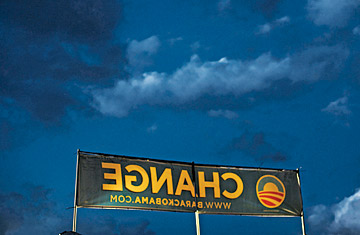
(3 of 5)
Economics for the Real World
Obama has pledged that his bank-regulation overhaul would be based "not on abstract models ... but on actual data on how actual people make financial decisions." That's a plain-English way of saying it will be guided by behavioral economics, not neoclassical economics.
Neoclassical economics — another University of Chicago specialty — has ruled our world for decades. It's the doctrine that markets know best: when government keeps its hands off free enterprise, capital migrates to its most productive uses and society prospers. But its elegant models rely on a bold assumption: rational decisions by self-interested individuals create efficient markets. Behavioral economics challenged this assumption, and the financial meltdown has just about shattered it; even former Fed chairman Alan Greenspan confessed his Chicago School worldview has been shaken. "We couldn't have planned a better marketing campaign for behavioral economics," MIT's Ariely quips. (See the best business deals of 2008.)
Behavioral economics doesn't ignore the market forces that were all-powerful in Econ 101, but it harnesses forces traditionally consigned to Psych 101. Behaviorists have always known we don't really act like the superrational Homo economicus of the neoclassical-model world. Years of studies of patients who don't take their meds, grownups who have unsafe sex, and other flawed decision makers have chronicled the irrationality of Homo sapiens. Some of our foibles are quite specific, like overvaluing things we have, overeating food in larger containers and overestimating the probability of improbable events — the quirk that made the Meet Barack Obama fundraising lottery such a smart idea. But in general, we're ignorant, shortsighted and biased toward the status quo. We're not as smart as Larry Summers. We procrastinate. Our impulsive ids overwhelm our logical superegos. We plan to lose weight, but ooh — a cupcake! We're especially irrational about money; we'll pay more for the same thing if we can use a credit card, if we think it's on sale, if it's marketed with photos of attractive women. No wonder we apply for mortgages we can't afford. No wonder our bankers approve them.
"We truly want to make better choices," explains Yale economist Dean Karlan. He's a co-founder of stickK.com, where users make binding "commitment contracts" to forfeit money to friends or charities — or even "anti-charities" they despise — if they fail to quit smoking, lose weight or meet other goals they set for themselves. "But we need help to get us there."
The Need to Know
The first step is knowledge. Studies suggest that better information — from public-service announcements, appeals by respected figures, even serial dramas to help reduce teen pregnancy and other social ills in developing countries — can assist us in making better choices. There was a run on energy-efficient lightbulbs after Oprah urged viewers to buy them; similarly, Michelle Obama's White House vegetable garden is intended to urge us toward fresh produce. We don't all realize that idling our cars wastes more energy than turning them off and on, or that granola is high in fat. And some of our choices are simply bewildering, which is why it's so easy to stumble into hidden fees and balloon payments tucked in the fine print of our mortgages. Even Ph.D.s can get confused by our society's paperwork; Thaler and Sunstein tell a story in Nudge about struggling to help a health economist pick a prescription-drug plan for her parents.
Nudge calls for aggressive rules for disclosure and clarity, to help us make more informed decisions about home loans, student loans, credit cards, health-care plans and retirement plans. Thaler points to an Executive Order, signed by Obama on his second day in office, that calls for new transparency through new technologies. "That's exactly what this is about," Thaler says. "If instead of the 30 pages of unintelligible crap that comes with a mortgage, you can upload it with one click to a website that will explain it and help you shop for alternatives, you make it as easy as shopping for a hotel."
